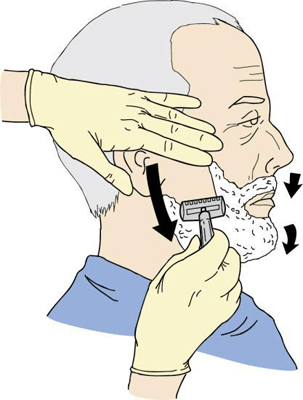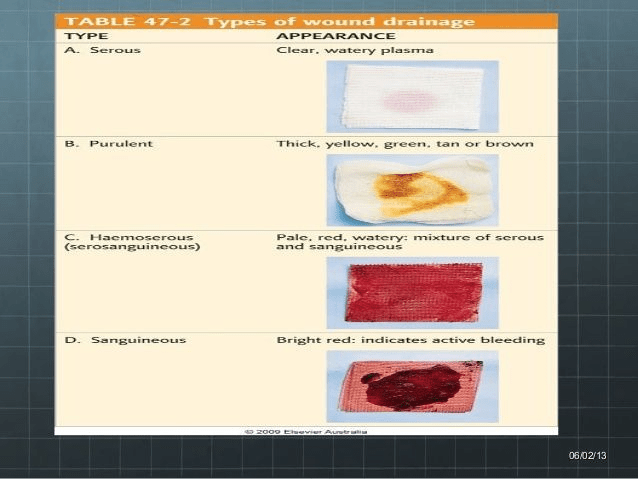Decreased mobility, decreased sensory perception, fecal or urinary incontinence, or poor nutrition.
What are the contributing factors associated with pressure injuries? Or some of the Braden scale categories.
Use short, firm strokes in the direction of hair growth.
What are shaving techniques for shaving a patient? 
Pulmonary aspiration, diarrhea, constipation, abdominal cramping, nausea, vomiting, delayed gastric emptying, serum electrolyte imbalance, fluid overload, hyperosmolar dehydration, tube occlusion or displacement.
What are complications associated with enteral tube feedings?
Urgency, dysuria, frequency, hesitancy, polyuria, oliguria, nocturia, dribbling, hematuria, and retention.
What are common symptoms of urinary alterations?
Peptic ulcers, Crohn's, malabsorption syndromes, colitis, & diverticulitis.
What are examples of gastrointestinal diseases?
Thick, yellow, green, tan, or brown stain.
What is purulent drainage?

This assessment is used to determine the patient's mental status, cognitive function, and physical ability to perform hygiene ADLs safely and efficiently.
What is an assessment of self-care ability?
Abnormal gag, cough during eating, change in voice tone or quality after swallowing, incomplete oral clearance or pocketing, regurgitation, pharyngeal pooling, weak, imprecise, or uncoordinated speech.
What are warning signs for dysphagia?
Anxiety and stress that can affect the sense of urgency, frequency, and inadequate relaxation of pelvic floor muscles or urinary sphincter.
What are psychological factors associated with urinary elimination?
Normal saline solution, until clear, fleet, glycerin, soapsuds, and phosphate solution.
What are types of enema orders?
Non-blanchable erythema, exposed dermis, visible adipose tissue, exposed cartilage, and eschar obscured extent of tissue loss.
What are the identifying characteristics of stages 1, 2, 3, 4, and unstageable pressure injuries?
This type of bath uses an antimicrobial agent to reduce the incidence of hospital-acquired infections on the skin, invasive lines, and catheters.
What is a chlorhexidine gluconate (CHG) bath?
The nurse should do this after a patient fails the bedside swallow screen.
What is make the patient NPO and notify the provider?
Set a schedule for drinking extra fluids, identify fluid preferences, increase high-fluid foods such as fruits, and encourage fluid intake in small volumes frequently.
What are ways to increase/maintain adequate PO fluid intake for a patient?
This test measures microscopic amounts of blood in feces.
What is fecal occult blood test?
Foam overlay, Low-air-loss, Air-fluidized, & Gel overlay.
What are specialty beds or overlays for support surfaces for patients with skin breakdown conserns?
Poor oral, skin, and foot care, or eye problems.
What are hygiene related risk factors?
Overweight & obesity, nutrition & healthy eating, heart disease & stroke, Infants, children, & adolescents, Women, and Workplace.
What are examples of Nutrition and Healthy Eating Objectives for Healthy People 2030?
Pyelonephritis and bacteremia.
What are serious upper urinary tract infections?
Endoscopy, anorectal manometry, KUB, Barium, ultrasound, Computed tomography scan, colonic transit study, & magnetic resonance imaging.
What are radiological and diagnostic tests seen with gastrointestinal conditions?
This skill requires the RN to clean a wound surface with an antiseptic solution. Allow to dry. Use swab from culturette tube. Obtain fluid sample from area free of necrotic tissue. Insert tip of swab into appropriate sterile container, and label.
What are the steps to culturing a wound?
Proper body mechanics and safe handling are important when turning or repositioning a patient in bed.
What are procedural guidelines for hygiene-related nursing skills?
A simple protein located in blood plasma.
What is Albumin?
Patient states urine leakage associated with a strong urge to void, coughing, sneezing, or laughing.
What are assessment findings related to urge incontinence/voiding problems?
Hydration, fiber intake, disease process, emotions, mobility, or medications.
What are factors that can affect bowel patterns?